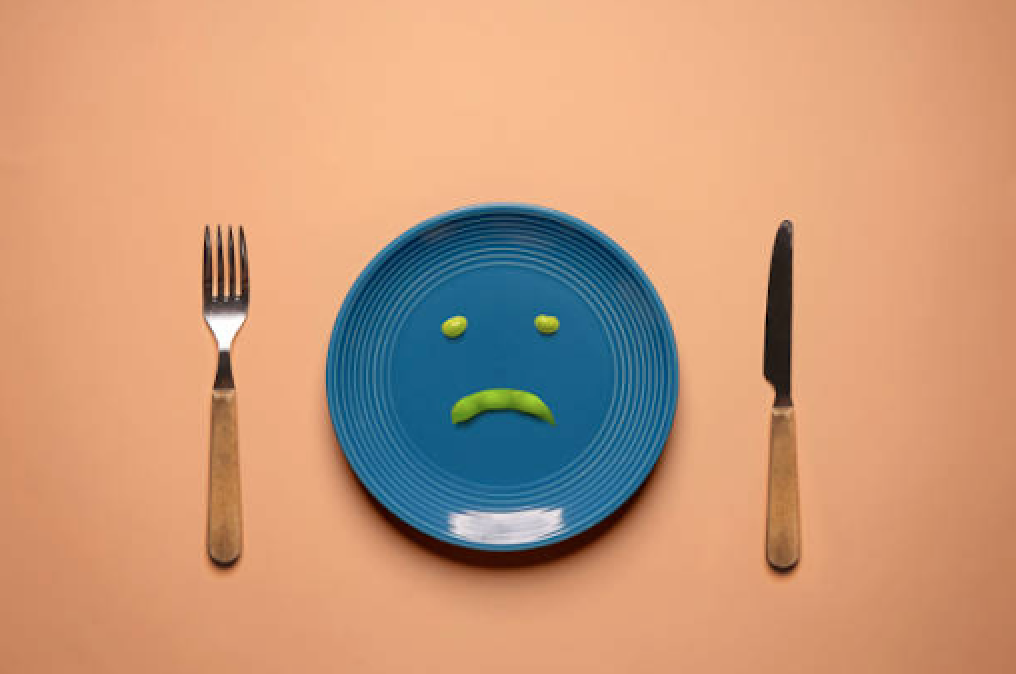Counting Calories Isn’t Cute
By Krizia Colon-Rosa
When you enter a grocery store your only mindset is to pick up food and goods. While going through an aisle, have you ever just grabbed a box of pasta, looked at the calories, and just said: “Yikes, that’s a little too high for my liking.” As media advances, so does society's standards of proper living and appearance. More than 28 million Americans have an eating disorder. Whether it’s gaining weight or losing weight, eating disorders are the deadliest mental illness.
What causes eating disorders? Eating disorders come from a broad perspective. The disorder may develop in the desire to lose weight or consume food in a form of a coping mechanism (this can also be identified as comfort foods). These kinds of behavior can lead to an unhealthy relationship with food and how you treat your body. This disorder is characterized by disturbed or disruptive food patterns. Eating disorders are also linked with other mental health issues like body dysmorphia, low self-esteem, obsessive-compulsive disorder, and depression. Women are more likely to develop an eating disorder than men, but that doesn’t mean that men are immune to the possibility. Nowadays, researchers use a multidimensional risk perspective to identify key factors for people who might have eating disorders. The more factors contributed, the more likely the person will end up developing an eating disorder.
Calorie intakes come in a variation depending on your health. Not all bodies are the same, meaning the number of calories won’t be the same, either. Especially if you have a health condition. These include type 2 diabetes, eating disorders (binge eating disorder, obesity), and cardiovascular diseases. On the health line, the US Department of Agriculture dietary guidelines provided a category of ages and daily calories required. Ages from 19-30 would have to have an intake of 2000 to 2400 calories. As the age goes up, the calorie intake goes down. With the provided guideline, they are also separated by sex. When women age has a larger calorie withdrawal compared to men. The difference between women to men is about 400-600 calories. An ideal calorie is different for everyone. Every individual has a different metabolism.
The benefits of counting calories can assist in better eating habits and taking accountability on cheat days. Having strict calorie intake can lead to healthy food choices. A strict diet can lead to obsessive behavior that may spiral into a series of issues. Counting calories may have its pros, but the cons seem to outweigh it to the point where the obsession can lead to unhealthy restrictions. An individual with an eating disorder may struggle with OCD (obsessive-compulsive disorder). People will focus on how much they eat, how long they exercise, and how much they lose weight. Everything they do must fall perfectly for the sake of having the “perfect body.” Due to this behavior, it’s hard for people to stop, and it's not always an easy fix.
Growing up as a gymnast, it was very important to have a healthy lifestyle both in and out of the gym. Our coaches were very strict about what we ate, especially if we brought snacks with us to competitions. At times it got to the extreme where we weren’t allowed to eat a certain amount of calories in a day. We were encouraged to spend more time working out than eating a proper meal. I struggled to have a healthy relationship with food throughout high school. Thankfully, I was able to improve my habits with the help of resources in college.
Recovering from an eating disorder is extremely difficult. Those who might not understand the issue might think “Oh, just eat something, that’ll help you gain the weight back.” Ignorant statements like that are problematic. Furthermore, an eating disorder is much more complex. Eating disorders are not a choice. Psychologically, there is a lot to unpack. An eating disorder can develop in different ways. Besides the desire to lose weight, individuals might have been bullied or exposed to a lot of stress. The reality of recovery is very complicated. It's not an easy road. But the many resources we have today, may save someone from a life of complications and loss of control. Catching the signs before an eating disorder develops can help prevent an individual from suffering in the long run. Explaining the multi-dimensional perspective in a way to prevent the development of eating disorders. Normalizing eating patterns, seeking professional help, and learning better habits may help.
References
5 Reasons to Stop Counting Calories | Psychology Today. (n.d.). Www.psychologytoday.com. Retrieved April 15, 2023, from https://www.psychologytoday.com/us/blog/you-are-what-you-eat/201602/5-reasons-stop-counting-calories
Eating Disorder Statistics | General & Diversity Stats | ANAD. (2016, May 8). https://anad.org/eating-disorders-statistics/?gclid=CjwKCAiAsNKQBhAPEiwAB-I5zWqg16QFxRLWHrJW5VvlybQTuNvnyT
Eating disorders: do you have a moral obligation to say something? (2015, May 1). MinnPost. https://www.minnpost.com/mental-health-addiction/2015/05/eating-disorders-do-you-have-moral-obligation-say-something/?gclid=Cj0KCQiA3rKQBhCNARIsACUEW_bUNwzb-Z8VzOl5PeX5Wpy-84R8xsofWD3ARZVJ49pArHnf0wFkeu0
How Many Calories Should You Eat per Day to Lose Weight? (2020, October 16). Healthline. https://www.healthline.com/nutrition/how-many-calories-per-day#calorie-basics
Publishing, H. H. (2020, October 1). Stop counting calories. Harvard Health. https://www.health.harvard.edu/staying-healthy/stop-counting-calories

